Getting Better With Age
Mike Wien won the 70-74 age group at IRONMAN 70.3 Worlds in St. George and 3 weeks later ran 3:29 in the Boston Marathon to win his age group there. He ran the Boston Marathon in 1980 in 2:58:48 and then stepped away from racing marathons. But he was always active and eventually found triathlon, which eventually led him back to running marathons. We had a long chat with him as he now readies himself for the New York City Marathon.
Slowtwitch: Thank you very much for your time.
Mike Wien: My pleasure if it helps inspire others to dream big and live more exciting lives with passion and purpose.
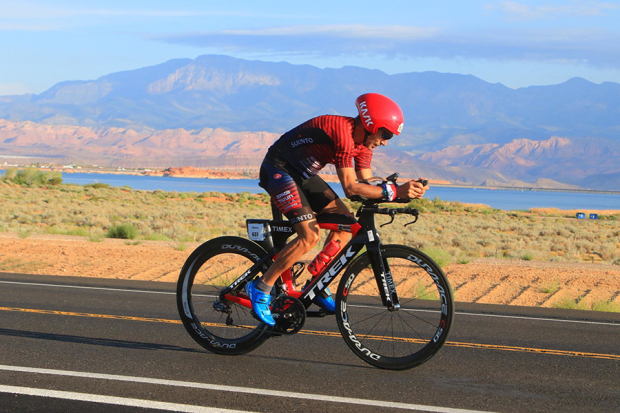
ST: You had a busy couple weeks, and is it now time to relax or is something else already looming on the schedule?
Mike: I have been running the Boston Marathon and the New York Marathon almost every year in the past 10 years, so my next race is the New York Marathon on November 7.
ST: Usually the 2 events aren’t that close together. Will that change how you approach the New York one this year?
Mike: Well I ran the Boston Marathon just two weeks after the Long Course Triathlon national championship in New York and three weeks after the Ironman 70.3 World Championship in St. George so having a four week break is a real treat. However, I have a physical therapist who is also an accomplished triathlete who loves a challenge and will appropriately torture me with needles and suction cups to make sure I am ready. It also gives me the opportunity to combine my recovery with my taper.
ST: At the Boston Marathon you won the 70-74 age group in 3:29:34 and in the process beat Gene Dykes by just about 30 seconds. What was your goal going in, and did you look at the possible challengers for the top spots?
Mike: For triathlons, I always study the competition. However, I have run the Boston Marathon 15 times and my goal has been to finish in the top 25. This year, I believed I had a very good chance of finishing in the top 10 with a 3:39:10 matching my 2019 New York Marathon time. I had no expectations of finishing even in the top three and was shocked when my wife Nannette saw me at mile 18 and let me know I was in the hunt in second place. So, other than checking the winning times from 2019, I had no idea who the challengers were.
ST: You bib number was fairly high with 13272 and everyone else in the top ten had a much lower 4-digit number. Where did you actually qualify and what time did you run?
Mike: I ran a 3:44:49 in the Boston Marathon and a 3:39:10 in the New York Marathon, both in 2019 and both well below the 4:05 qualifying time in my previous age group.
ST: Which shoes did you use in Boston?
Mike: The HOKA Ironman Kona Carbon X
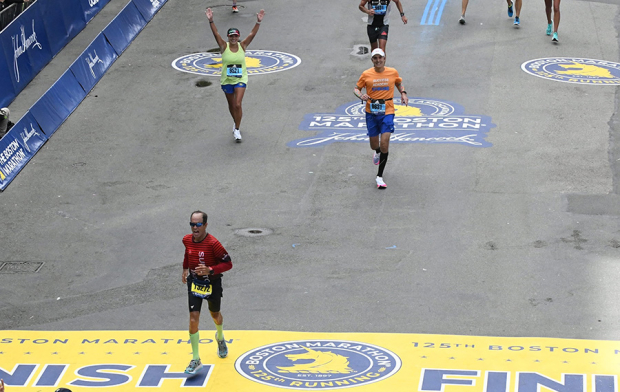
ST: What about your every day running shoes?
Mike: Hoka Clifton 7. I make comfort a priority
ST: You mentioned running 15 times in Boston, but what was your fastest time there?
Mike: My best time was in 1980 with a 2:58:48. After that race, I became a recreational runner and did not run Boston again for 25 years until 2005.
ST: Why the long hiatus?
Mike: Qualifying for Boston back in 1980, the qualifying time for men under 40 was 2:50, was a long shot and a dream goal. I qualified in 1979 and lived the dream to run in Boston in 1980. I kept running for exercise and four ran more marathons in the early 1980s pacing people, but my racing days were over. In 2003, I started training for my first Ironman and ran a marathon as part of my training in 2004 that was a Boston Qualifier. That got me back in the game.
ST: Was this Boston Marathon result your highest age group category placing there?
Mike: I have been in the top 10 one time, 8th in 2009 with a 3:04:37. I was in the top 20 two other times – 14th in 2010 with a 3:04:25 and 19th in 2013 with a 3:21:15 – over an hour before the bombing.
ST: Where were you when the bombing took place?
Mike: I was taking a shower in the Sheraton Hotel two blocks from the finish line. I never heard anything. My wife was having lunch near the finish line with a friend. She finally got through on her cell phone 30 minutes later to tell me she was OK. I had no idea what she was talking about, and she told me to turn on the news. The following morning, I wrote a blog – “Last Night I got a look at my real net worth.” It was not on a financial statement. It was in the form of emails, text messages, voice mails and Facebook posts all saying the same thing. “Mike, I know you are in Boston, are you OK.” Relationships – That is my real net worth.
ST: While you are also a very competitive triathlete, your background is running. Can you talk about that aspect of your life? How did it all get started
Mike: I was a wrestler in high school – all 93 pounds of me. Our wrestling coach insisted we compete in a fall sport. It was either football or cross country. The decision was obvious. However, I was not much of an athlete and quit the cross country team after four weeks. The coach reluctantly let me back on the team the next year and I worked my way up to the seventh man on the Varsity Team as a senior. It was a 5-man team. 10 years later as my business career was booming and so was my desire to eat at great restaurants, I started running to burn calories maintain a healthy weight. That led to running my first marathon in 1978 and qualifying for Boston in 1979.
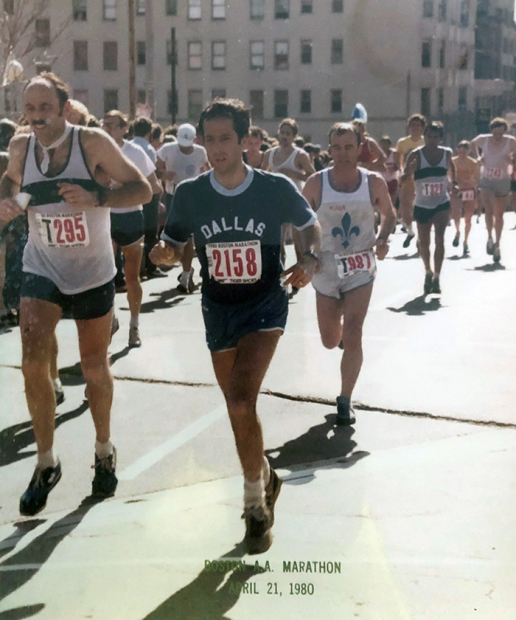
ST: What are some of the personal best times of yours in various running distances?
Mike: My first Boston qualifier in 1979 – 2:48:18. In 1981, I ran a 10k on the Pepsi Corporate Team in 36:12.
ST: In 2004 I think you find triathlon, or triathlon found you. Which event did you do first, and how did it go?
Mike: I actually started with the AARP Triathlon series for people over 50 in 2002 with a sprint triathlon. But I did not get serious until 2003 when my niece convinced me to signup for Ironman Florida in 2004. I took 4th and missed qualifying for Kona by one place. I was hooked and took 2nd in Ironman Wisconsin in 2005. That qualified me for Kona for the first time in 2006.
ST: A few weeks back you also won your age group at 70.3 Worlds in St. George. And I believe you won with the strength of your run. How far back and how many places back were you, and then how fast did you run?
Mike: At the Ironman 70.3 World Championship in St. George, Utah, I came off the bike and head out for the run and my wife Nannette (married 46 years) was in her position to give me the competitive intelligence – I was second in my age group, 10 minutes behind the leader, Michael Orendoff. As I finished the first lap of a 2-lap half marathon, Nannette let me know I had closed the gap to 5 minutes. I ran the 13.1 miles at an average pace of 8:34.
ST: Talk about the earlier part of that day and how it unfolded.
Mike: The swim start was perfect with calm warm water and a staggered start. The wind picked up on the second half of the swim which created choppy waves. The first half of the bike was also terrific with little wind, a nice cloud cover and a comfortable temperature. That was short lived as the wind picked up, followed by the rain, lightning, and thunder and finally the little pings of hail hitting my helmet. The run played to my strength as a hot weather runner as the clouds parted, the sun came out and turned the course into a frog frier. Well, they do not call this race a sissy-man.
ST: What kind of bike do you ride and how is it set up?
Mike: I race for Trek and ride the Speed Concept 9. I just had a new bike fit at Full Cycle Bikes in Boulder three weeks before the race to help me be more aerodynamic and to eliminate my knees splaying in the upstroke position. Reducing the length of the crank arm fixed the splaying and allowed the seat to be lowered which improve aerodynamics and power. And I am using a Stages Power Meters. They are Boulder based and have been very kind to me.
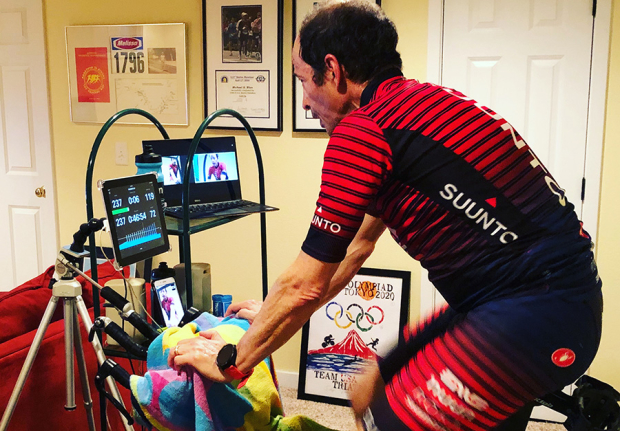
ST: In triathlon where do you think you can still improve?
Mike: My swim is average, but any improvement will not make that much of a difference. My run is obviously my strength and I do not think there is room for much improvement there. In my age group, just maintaining my pace as I get older is an accomplishment. The bike is the longest segment of the race and the area for the greatest potential for improvement for me, especially on climbing hills.
ST: Do you do all of your cycling outside, or do you also have an indoor setup to ride? If so, can you describe it and how much time you spend on it?
Mike: I love riding outside. I live in Boulder, Colorado and have beautiful canyons, mountains and plenty of flat farmland outside my front door. However, I try to ride two to three times per week on my Wahoo KICKR for 60 to 75 minutes. I use an iPad as my control panel, and I have a coach that programs my workout remote and gets immediate feedback when I complete a workout.
ST: Which app do you use?
Mike: My coach programs my KICKR workouts on Trainer Road. I also download to Strava for the virtual races.
ST: There is this theory that triathletes in later years will match up better and better with pure runners, because with longer recovery periods as athletes get older, a triathlete can still swim and ride while the legs might be too sore to run. What do you think about that thought process?
Mike: I started cross training in my fifties because my legs could not take all the miles of running. Swimming, biking and running allows me to take days off in each sport without having to take any days off from training. Case in point – The Boston Marathon was on Monday. I walked 5 miles with my wife on Tuesday. I rode on a stationary bike on Wednesday and went for an easy jog on Thursday. Cross training gives you plenty of options for recovery without having to become a temporary couch potato.
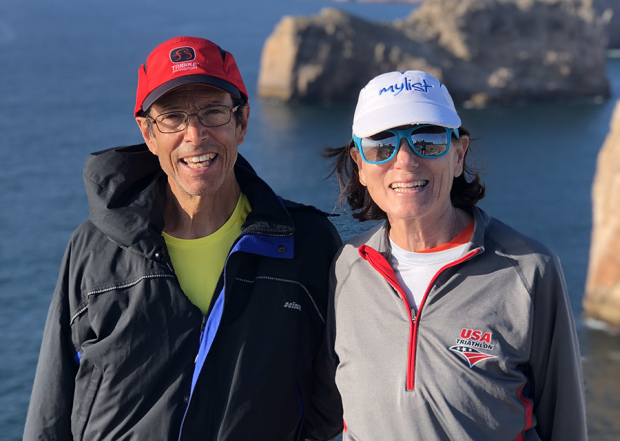
ST: Is there anything else to know?
Mike: For the majority of the triathletes or marathon runners, participating in an event is not about finishing on the podium. It is about completing a personal goal. It is about developing training buddies along the way. It is about encouraging others to do their best.It is more about effort and less about talent. It is about living an exciting life with passion and purpose. It is about finishing, because just finishing is winning. And that is why I love both of these endurance sports.



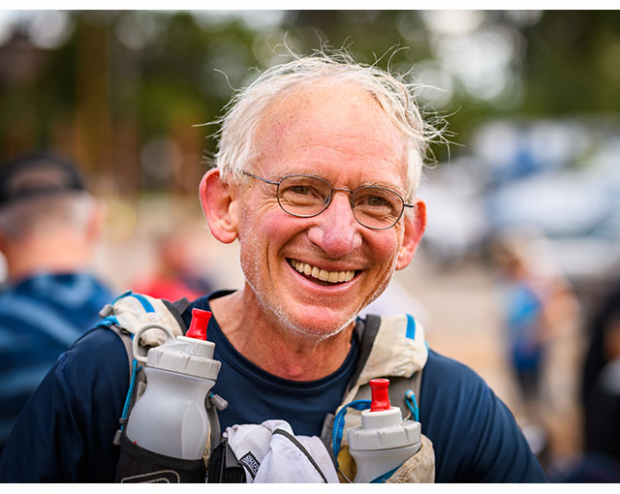
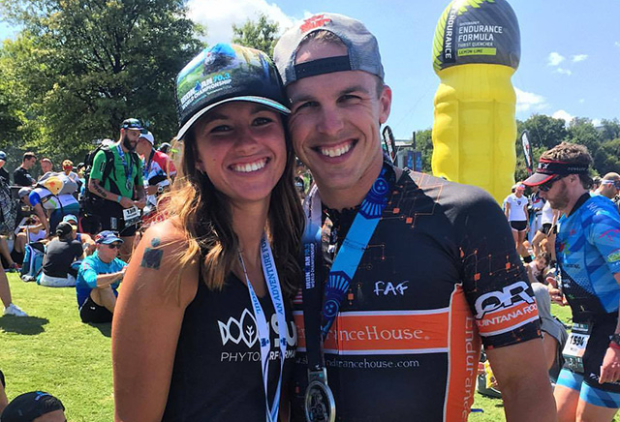
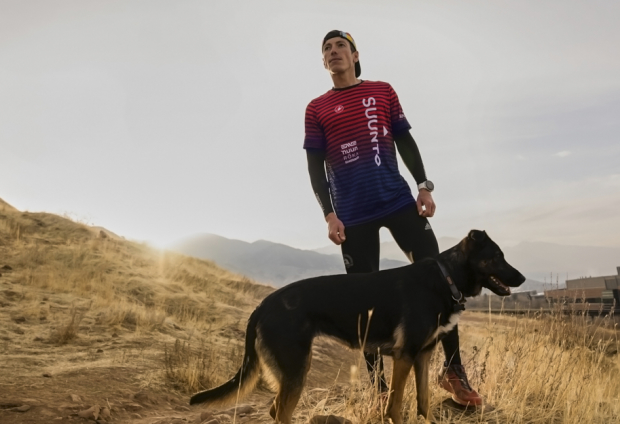

Start the discussion at forum.slowtwitch.com